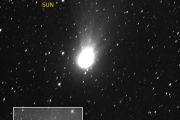
Copernical Team
AFRL AFOSR conduct successful hypersonics rocket launch at Wallops
 The BOLT II "In memory of Mike Holden" flight experiment, managed by the Air Force Research Laboratory/Air Force Office of Scientific Research (AFRL/AFOSR), launched on the evening of March 21 from the National Aeronautics and Space Administration's (NASA) Wallops Flight Facility in Virginia. Dr. Michael Holden, who, up until his passing in 2019, had been a leader in the hypersonics field since
The BOLT II "In memory of Mike Holden" flight experiment, managed by the Air Force Research Laboratory/Air Force Office of Scientific Research (AFRL/AFOSR), launched on the evening of March 21 from the National Aeronautics and Space Administration's (NASA) Wallops Flight Facility in Virginia. Dr. Michael Holden, who, up until his passing in 2019, had been a leader in the hypersonics field since China's Tianzhou-2 cargo craft leaves space station core module
 China's cargo spacecraft Tianzhou-2 separated from the core module of the country's space station Sunday afternoon, announced the China Manned Space Agency.
At 3:59 pm Beijing Time, Tianzhou-2 left the core module of the Tiangong space station after completing all of its scheduled tasks, said the agency.
During its operation in orbit, Tianzhou-2 carried out a series of extended appli
China's cargo spacecraft Tianzhou-2 separated from the core module of the country's space station Sunday afternoon, announced the China Manned Space Agency.
At 3:59 pm Beijing Time, Tianzhou-2 left the core module of the Tiangong space station after completing all of its scheduled tasks, said the agency.
During its operation in orbit, Tianzhou-2 carried out a series of extended appli Eutelsat and OneWeb sign agreement to address key connectivity verticals
 Eutelsat Communications and OneWeb, the low Earth orbit (LEO) satellite communications company, has announced a global, multi-year Distribution Partnership Agreement (DPA) for OneWeb capacity. The agreement paves the way for Eutelsat to commercialise OneWeb services across key verticals including Maritime, Aviation, Enterprise, Telcos and Government.
The partnership reflects the deepening
Eutelsat Communications and OneWeb, the low Earth orbit (LEO) satellite communications company, has announced a global, multi-year Distribution Partnership Agreement (DPA) for OneWeb capacity. The agreement paves the way for Eutelsat to commercialise OneWeb services across key verticals including Maritime, Aviation, Enterprise, Telcos and Government.
The partnership reflects the deepening Fleet Space Technologies to revolutionise mineral exploration with launch of Geosphere
 GeoSphere is a first-of-its-kind system that combines wireless Geodes, edge computing and a constellation of low earth orbit (LEO) nanosatellites to discover critical resources up to 100 times faster than traditional methods.
It also drastically reduces the requirement for environmentally damaging elements of existing surveyance practices such as the use of explosives, noise machines and d
GeoSphere is a first-of-its-kind system that combines wireless Geodes, edge computing and a constellation of low earth orbit (LEO) nanosatellites to discover critical resources up to 100 times faster than traditional methods.
It also drastically reduces the requirement for environmentally damaging elements of existing surveyance practices such as the use of explosives, noise machines and d GS Yuasa Lithium Power completes PDR of scalable spacecraft battery
 GS Yuasa Lithium Power (GYLP) has announced the successful completion of the Preliminary Design Review (PDR) for a new scalable small form factor battery design. With PDR complete the battery design will now move into the critical design phase.
GYLP's design integrates the recently qualified LSE12x Lithium-ion Cell developed by GS Yuasa Technology LTD (GYT) and seeks to align with smaller
GS Yuasa Lithium Power (GYLP) has announced the successful completion of the Preliminary Design Review (PDR) for a new scalable small form factor battery design. With PDR complete the battery design will now move into the critical design phase.
GYLP's design integrates the recently qualified LSE12x Lithium-ion Cell developed by GS Yuasa Technology LTD (GYT) and seeks to align with smaller Advanced Air Mobility looks ahead to automation
 Using software to handle tasks to assist people is not a new concept - look at our computers, cell phones or electric cars.
Advanced Air Mobility, or AAM, aircraft intend to apply that same idea with new software algorithms and hardware such as sensors and radars. Technology like this could enable vehicles to operate without a pilot, or if a pilot is in the loop, increase the safety. Use c
Using software to handle tasks to assist people is not a new concept - look at our computers, cell phones or electric cars.
Advanced Air Mobility, or AAM, aircraft intend to apply that same idea with new software algorithms and hardware such as sensors and radars. Technology like this could enable vehicles to operate without a pilot, or if a pilot is in the loop, increase the safety. Use c AFRL CISLunar highway patrol system seeks industry collaboration
 The Air Force Research Laboratory's (AFRL) Space Vehicles Directorate is seeking partners to design and inform the capabilities of the Cislunar Highway Patrol System (CHPS) satellite, to provide space domain awareness beyond Geosynchronous orbit, in the region of the moon that is experiencing increasing activity.
A draft Request for Proposals was posted last week, on the NSTXL.org website,
The Air Force Research Laboratory's (AFRL) Space Vehicles Directorate is seeking partners to design and inform the capabilities of the Cislunar Highway Patrol System (CHPS) satellite, to provide space domain awareness beyond Geosynchronous orbit, in the region of the moon that is experiencing increasing activity.
A draft Request for Proposals was posted last week, on the NSTXL.org website, Tailwind completes Terran Orbital acquisition process
 Tailwind Two Acquisition Corp. (NYSE: TWNT) has announced the completion of its business combination with Terran Orbital Corporation ("Terran Orbital"), a leading small satellite manufacturer primarily serving the United States aerospace and defense industry.
In connection with the completion of the business combination, Tailwind Two has been renamed Terran Orbital Corporation (the "Compan
Tailwind Two Acquisition Corp. (NYSE: TWNT) has announced the completion of its business combination with Terran Orbital Corporation ("Terran Orbital"), a leading small satellite manufacturer primarily serving the United States aerospace and defense industry.
In connection with the completion of the business combination, Tailwind Two has been renamed Terran Orbital Corporation (the "Compan High Throughput Satellites set to boom
 Euroconsult has released the 6th edition of its High Throughput Satellites (HTS) report - its in-depth analysis of geostationary (GEO) and non-geostationary (NGSO) HTS markets including major drivers, strategic issues, competitive landscape and detailed forecasts of capacity supply and associated demand take-up.
After helping reshape the satellite communications industry through their ever
Euroconsult has released the 6th edition of its High Throughput Satellites (HTS) report - its in-depth analysis of geostationary (GEO) and non-geostationary (NGSO) HTS markets including major drivers, strategic issues, competitive landscape and detailed forecasts of capacity supply and associated demand take-up.
After helping reshape the satellite communications industry through their ever Gilmour Space wins major grant to develop Australia's space manufacturing capability
 A $157 million bid led by Queensland-based Gilmour Space Technologies to grow sovereign space manufacturing in Australia has been awarded the largest Modern Manufacturing Initiative Collaboration (MMIC) grant for Space by the Federal Government.
Minister for Industry, Energy and Emissions Reduction Angus Taylor MP said in a statement that the Government's $52 million co-investment in the A
A $157 million bid led by Queensland-based Gilmour Space Technologies to grow sovereign space manufacturing in Australia has been awarded the largest Modern Manufacturing Initiative Collaboration (MMIC) grant for Space by the Federal Government.
Minister for Industry, Energy and Emissions Reduction Angus Taylor MP said in a statement that the Government's $52 million co-investment in the A 






























